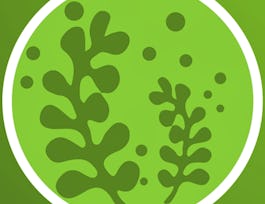Focusing on the Large Marine Ecosystems (LMEs) of the world, this course will introduce the concept and practice of ecosystem-based management. LMEs occupy areas of coastal ocean at least 200 000 km² or greater in size. These coastal waters produce 12.6 trillion USD in ecosystem goods and services annually and are vitally important for billions of people around the globe.


Large Marine Ecosystems: Assessment and Management
Taught in English
Some content may not be translated
15,596 already enrolled
(287 reviews)
What you'll learn
Large Marine Ecosystems (LMEs) and the management of human activities in an integrated fashion across political boundaries and economic sectors.
The concepts and tools used in the multi-sector assessment and management of Large Marine Ecosystems (LMEs).
Skills you'll gain
Details to know

Add to your LinkedIn profile
16 quizzes
See how employees at top companies are mastering in-demand skills


Earn a career certificate
Add this credential to your LinkedIn profile, resume, or CV
Share it on social media and in your performance review

There are 6 modules in this course
Introducing the Large Marine Ecosystem approach, ecosystem based management principles, and the five modules. There are three topics covered in this first week - ecosystem-based management, the concept of Large Marine Ecosystems, and the 5-module approach to assessment and management. As well as my lectures, there are also summaries of some key readings and links to other resources. We've included practice quizzes to help you recap and test your understanding of the key concepts as we move through the lessons. There is one graded quiz at the end of the week, which carries marks - but you may take the quiz more than once. At the end of this week, and all the other weeks, Dr Kenneth Sherman will share his insights about the topics we have covered.
What's included
8 videos8 readings4 quizzes3 discussion prompts2 plugins
In this week, we deal with the three natural science modules within the five module approach.
What's included
7 videos8 readings3 quizzes1 peer review1 discussion prompt2 plugins
We move onto the two human dimensions of the five module approach.
What's included
5 videos5 readings4 quizzes1 discussion prompt1 plugin
This is the heart of the course - delving into the Transboundary Diagnostic Analysis (TDA) and Strategic Action Programme (SAP).
What's included
6 videos4 readings2 quizzes1 peer review1 discussion prompt3 plugins
This week we move into the application of the approaches and the tools we have been discussing - with a description of how LME projects are implemented - focusing on marine ecosystem-based management (EBM).
What's included
6 videos4 readings3 quizzes1 peer review1 discussion prompt1 plugin
We have included a number of case studies of LMEs, inviting marine ecosystem managers and scientists from across our network to describe their work in implementing EBM.
What's included
9 videos10 readings1 peer review1 discussion prompt4 plugins
Instructor

Recommended if you're interested in Governance and Society

Google Cloud

Google Cloud

University of California San Diego
Why people choose Coursera for their career




Learner reviews
Showing 3 of 287
287 reviews
- 5 stars
85.36%
- 4 stars
11.14%
- 3 stars
1.74%
- 2 stars
0.69%
- 1 star
1.04%

Open new doors with Coursera Plus
Unlimited access to 7,000+ world-class courses, hands-on projects, and job-ready certificate programs - all included in your subscription
Advance your career with an online degree
Earn a degree from world-class universities - 100% online
Join over 3,400 global companies that choose Coursera for Business
Upskill your employees to excel in the digital economy
Frequently asked questions
Access to lectures and assignments depends on your type of enrollment. If you take a course in audit mode, you will be able to see most course materials for free. To access graded assignments and to earn a Certificate, you will need to purchase the Certificate experience, during or after your audit. If you don't see the audit option:
The course may not offer an audit option. You can try a Free Trial instead, or apply for Financial Aid.
The course may offer 'Full Course, No Certificate' instead. This option lets you see all course materials, submit required assessments, and get a final grade. This also means that you will not be able to purchase a Certificate experience.
When you purchase a Certificate you get access to all course materials, including graded assignments. Upon completing the course, your electronic Certificate will be added to your Accomplishments page - from there, you can print your Certificate or add it to your LinkedIn profile. If you only want to read and view the course content, you can audit the course for free.
You will be eligible for a full refund until two weeks after your payment date, or (for courses that have just launched) until two weeks after the first session of the course begins, whichever is later. You cannot receive a refund once you’ve earned a Course Certificate, even if you complete the course within the two-week refund period. See our full refund policy.















